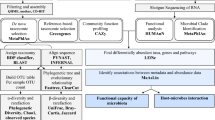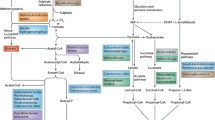Abstract
Background
Increasing data indicates the gut flora including bacteria and fungi combined with environmental factors are important in the pathogenesis of colorectal cancer (CRC). Understanding differences in the microbiome in patients with colon neoplasia will foster the development of biomarkers for early detection.
Aims
Determine the association of microbiome with presence of adenomas and predicted CRC risk.
Methods
In subjects referred for colonoscopy, the NCI CRC risk assessment tool was completed and stool for microbiome analysis as well as fecal immunochemical test (FIT) were collected. We calculated the microbiome alpha diversity using the Shannon index as well as individual bacterial and fungal species.
Results
Among 34 patients, we identified 10 with one or more adenomas. Only 2 patients were FIT positive. The median predicted lifetime CRC risk was 2.75% and the prevalence of adenoma was higher in the fourth quartile (P < 0.001). The measured alpha diversity was somewhat higher in patients with adenomas (P = 0.07). We identified 4 bacterial species with an increased relative abundance among patients with adenomas [P < 0.5]. Lifetime CRC risk was associated with 2 specific bacterial species, P. distasonis & E. hermannii [P = 0.05 & 0.09, respectively]. No associations were seen with fungal species and adenoma prevalence or lifetime CRC risk.
Conclusions
In addition to a strong correlation of predicted CRC risk and adenoma prevalence, we also found important differences in specific bacterial species and both adenoma prevalence and CRC risk. Larger trials are needed to potentially implement further data in the clinical setting.




Similar content being viewed by others
Abbreviations
- CRC:
-
Colorectal cancer
- FIT:
-
Fecal immunochemical test
- NCI:
-
National Cancer Institute
- MDS:
-
Multidimensional scaling
- DNA:
-
Deoxyribonucleic acid
References
Song M, Chan AT, Sun J. Influence of the gut microbiome, diet and environment on risk of colorectal cancer. Gastroenterology 2020;158:322–340.
Wieczorska K, Stolarek M, Stec R. The role of the gut microbiome in colorectal cancer: where are we? Where are we going? Clin Colorectal Cancer 2020;19:5–12.
Ahn J, Sinha R, Pai Z et al. Human gut microbiome and risk for colorectal cancer. J Natl Cancer Inst 2013;105:1907–1911.
Thomas AM, Manghi P, Asnicar F et al. Metagenomic analysis of colorectal cancer datasets identifies cross-cohort microbial diagnostic signatures and a link with choline degradation. Nat Med 2019;25:667–668.
Baxter NT, Ruffin MT, Rogers MAM et al. Microbiota-based model improves the sensitivity of fecal immunochemical test for detecting colonic lesions. Genome Med 2016;8:37.
Wong SH, Kwong TNY, Chow TC et al. Quantitation of faecal Fusobacterium improves faecal immunochemical test in detecting advanced colorectal neoplasia. Gut 2017;66:1441–1448.
Dadkhah E, Sikaroodi M, Korman L et al. Gut microbiome identifies risk for colorectal polyps. BMJ Open Gastro 2019;6:e000297.
Castellarin M, Warren RL, Freeman JD et al. Fusobacterium nucleatum infection is prevalent in human colorectal carcinoma. Genome Res 2012;22:299–306.
Kostic AD, Gevers D, Pedamallu CS et al. Genomic analysis identifies association of Fusobacterium with colorectal carcinoma. Genome Res 2012;22:292–298.
Ito M, Kanno S, Nosho K et al. Association of Fusobacterium nucleatum with clinical and molecular features in colorectal serrated pathway. Int J Cancer 2015;137:1258–1268.
Boleij A, Hechenbleikner EM, Goodwin AC et al. The Bacteroides fragilis toxin gene is prevalent in the colon mucosa of colorectal cancer patients. Clin Infect Dis 2015;60:208–215.
Bonnet M, Buc E, Sauvanet P et al. Colonization of the human gut by E. coli and colorectal cancer risk. Clin Cancer Res 2014;20:859–67.
Abdulamir AS, Hafidh RR, Abu Bakar F. The association of Streptococcus bovis/gallolyticus with colorectal tumors: the nature and the underlying mechanisms of its etiological role. J Exp Clin Cancer Res 2011;30:11.
Coker OO, Nakatsu G, Dai RZ et al. Enteric fungal microbiota dysbiosis and ecological alterations in colorectal cancer. Gut 2019;68:654–662.
Huseyin CE, O’Toole PW, Cotter PD, Scalan PD. Forgotten fungi-the gut mycobiome in human health and disease. FEMS Microbiol Rev 2017;41:479–511.
Cui L, Morris A, Ghedin E. The human mycobiome in health and disease. Genome Med 2013;5:63.
Peters BA, Dominianni C, Shapiro JA et al. The gut microbiota in conventional and serrated precursors of colorectal cancer. Microbiome 2016;4:69–83.
Funding
This work was funded in part by the Case Comprehensive Cancer Center.
Author information
Authors and Affiliations
Corresponding author
Ethics declarations
Conflict of interest
All authors do not have any potential conflicts of interest.
Ethical approval
All procedures performed in studies involving human participants were in accordance with the ethical standards of the institutional and/or national research committee and with the 1964 Helsinki declaration and its later amendments or comparable ethical standards.
Additional information
Publisher's Note
Springer Nature remains neutral with regard to jurisdictional claims in published maps and institutional affiliations.
Rights and permissions
Springer Nature or its licensor holds exclusive rights to this article under a publishing agreement with the author(s) or other rightsholder(s); author self-archiving of the accepted manuscript version of this article is solely governed by the terms of such publishing agreement and applicable law.
About this article
Cite this article
Alharfi, S., Furey, N., Al-Shakhshir, H. et al. Fecal Microbiome Associated with Both Colon Adenomas and Lifetime Colorectal Cancer Risk. Dig Dis Sci 68, 1492–1499 (2023). https://doi.org/10.1007/s10620-022-07673-8
Received:
Accepted:
Published:
Issue Date:
DOI: https://doi.org/10.1007/s10620-022-07673-8




